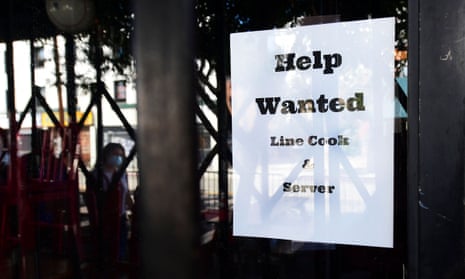Research into the lingering effects of Covid-19 on the US workforce has confirmed what anybody who has waited an extended time for a delivery – or been unable to get a restaurant table – already knows: the pandemic has caused massive shortages in the labor market.
On top of the quarter-million people of working age who have died from coronavirus, at least twice that number across all ages have permanently disappeared from the workforce, the analysis by the National Bureau of Economic Research shows.
Other studies have shown the impact on the workforce of long Covid, where symptoms remain months or years after the initial infection has passed. A Brookings Institution study estimated last month that as many as 2.4 million have missed work, are temporarily absent or are working reduced hours because of the lingering effects of the virus.
However, this new study focuses more on the apparent effect on labor supply caused by the pandemic and those who have permanently stopped working – through choice or necessity – as a result of their sickness.
Among the main reasons are large numbers of working people transitioning straight from illness into retirement, according to the researchers, who looked at federal and state level data on Covid infections as well as deaths to evaluate the probability of workers remaining in the labor force after getting sick.
“Our estimates suggest Covid-19 illnesses have reduced the US labor force by approximately 500,000 people,” say the study’s authors, Gopi Shah Goda of Stanford University and Evan Soltas of Massachusetts Institute of Technology’s economics department.
“Covid-19 illnesses persistently reduce labor supply. We estimate that workers with week-long work absences are 7% less likely to be in the labor force one year later compared to otherwise-similar workers who do not miss a week of work for health reasons.”
The study adds: “Many who fall ill but survive Covid-19 suffer from enduring health problems … approximately 500,000 adults are neither working nor actively looking for work due to the persistent effects of Covid-19 illnesses.”
The researchers say that while labor shortages caused by the pandemic are apparent in all corners of industry, it has been a challenge to evaluate their permanence.
“Many in government and the media have speculated that such post-acute conditions have reduced labor supply, but data limitations have made it difficult to assess these impacts and the economic costs of Covid-19 illnesses more broadly,” the authors say.
The Guardian has reported how some employers around the US are responding to perceived worker shortages by pursuing cheap sources of labor, such as people currently or formerly in prison.
The restaurant industry in Michigan, Texas, Ohio and Delaware recently announced a prison work release program for the food service and hospitality industries. And in April, Russell Stover candy production facilities in Iola and Abilene, Kansas, began using prison labor through the Topeka correctional facility in response to staffing issues disrupting production lines.
Meanwhile, a waste management conference in Nevada in June heard that a solution to their own industry’s shortage of workers could also be addressed by tapping the less “traditional” talent pool.
